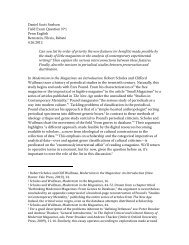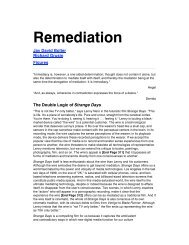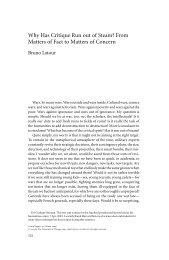The Exploit: A Theory of Networks - asounder
The Exploit: A Theory of Networks - asounder
The Exploit: A Theory of Networks - asounder
Create successful ePaper yourself
Turn your PDF publications into a flip-book with our unique Google optimized e-Paper software.
82 Nodes<br />
in terms <strong>of</strong> probability and thinking in terms <strong>of</strong> possibility. Informatic<br />
spaces do not bow to political pressure or influence, as social spaces<br />
do. But informatic spaces do have bugs and holes, a by - product <strong>of</strong><br />
high levels <strong>of</strong> technical complexity, which make them as vulnerable<br />
to penetration and change as would a social actor at the hands <strong>of</strong><br />
more traditional political agitation.<br />
Let us reiterate that we are referring only to protocological resistance<br />
and in no way whatsoever suggest that non - protocological practice<br />
should abandon successful techniques for effecting change such<br />
as organizing, striking, speaking out, or demonstrating. What we suggest<br />
here is a supplement to existing practice, not a replacement for it.<br />
<strong>The</strong> goal for political resistance in life networks, then, should be the discovery<br />
<strong>of</strong> exploits—or rather, the reverse heuristic is better: look for traces<br />
<strong>of</strong> exploits, and you will find political practices.<br />
Let’s flesh out this idea using examples from actual practice, from<br />
specific scenarios. <strong>The</strong> first is an instance <strong>of</strong> the protocological masquerading<br />
as biological: the computer virus. Deleuze mentions computer<br />
viruses in his 1990 interview with Negri:<br />
It’s true that, even before control societies are fully in place, forms <strong>of</strong><br />
delinquency or resistance (two different things) are also appearing.<br />
Computer piracy and viruses, for example, will replace strikes and what<br />
the nineteenth century called “sabotage” (“clogging” the machinery). 60<br />
Computer viruses have a spotted history; they <strong>of</strong>ten involve innovative<br />
programming techniques that have been used in other areas <strong>of</strong><br />
computer science, but they are also <strong>of</strong>ten tagged as being part <strong>of</strong> delinquent<br />
or criminal activities. Should computer viruses be included in<br />
the “history” <strong>of</strong> computers? How much have viruses and antivirus<br />
programs contributed to the development <strong>of</strong> “<strong>of</strong>ficial” computer science<br />
and programming? <strong>The</strong> majority <strong>of</strong> the early instances <strong>of</strong> computer<br />
viruses have ties to either the university or the corporation: the<br />
“Darwin” game (AT&T/ Bell Labs, early 1960s), “Cookie Monster”<br />
(MIT, mid - 1960s), “Creeper” and “Reaper” (BBN, early 1970s), “tapeworm”<br />
(XeroxPARC, early 1970s), and so on. 61 Like early hacking<br />
activities, their intent was mostly exploratory. Unlike hacking, how-









